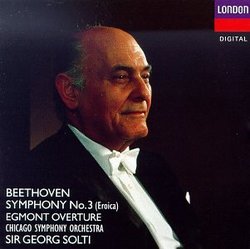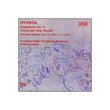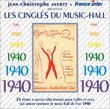| All Artists: Ludwig van Beethoven, Georg Solti, Chicago Symphony Orchestra Title: Beethoven: Symphony No. 3 "Eroica"; Egmont Overture Members Wishing: 0 Total Copies: 0 Label: Decca Release Date: 5/16/1990 Genre: Classical Styles: Historical Periods, Classical (c.1770-1830), Symphonies Number of Discs: 1 SwapaCD Credits: 1 UPC: 028943008723 |
Search - Ludwig van Beethoven, Georg Solti, Chicago Symphony Orchestra :: Beethoven: Symphony No. 3 "Eroica"; Egmont Overture
 | Ludwig van Beethoven, Georg Solti, Chicago Symphony Orchestra Beethoven: Symphony No. 3 "Eroica"; Egmont Overture Genre: Classical
|
Larger Image |
CD DetailsSimilar CDs |
CD ReviewsWhat happened? RaleighObserver | Eastern USA | 05/22/2005 (3 out of 5 stars) "I was first introduced to Solti as an opera conductor through his traversal of Wagner's "Ring" cycle for Decca/London in the late 1950's. Solti stunned a classical music world used to Furtwangler's interpretations of Wagner by lightening the textures, quickening the tempi and emphasizing the dramatic structure of the pieces as well as the mytho-musical ones. Throughout that cycle, Solti showed himself to be an exciting, first-class opera conductor. So what happened here? Beethoven's Eroica is one of the most passionate, joyous, exciting, dramatic scores out there. But Solti delivers a performance best described as cautious and somewhat limp. One other reviewer, comparing this performance to Solti's earlier one with the Vienna Philharmonic, referred to it as a "sodden mess", and while that may be a bit extreme it hits the point. Try this for a quick comparison: check out the excitement in the transition from the initial (strings) statement of the opening theme to the full tutti statement in these three recordings: Solti's; Monteux's with the Vienna Philharmonic; and Klemperer's with the Danish Radio Symphony. Solti is just plain limp, uninspired. And this quality pervades the entire performance. The performance also suffers from a quality which I saw emerge in Solti later in life: a failure to put all of those gorgeously-shaped phrases into a coherent, musically dramatic structure. An odd problem for a conductor who burst into public consciousness by revealing the dramatic structure of one of the most symphonic of all operatic cycles, but there it is. Somehow, in all of Solti's Chicago recordings I've heard, the sum is less than the parts. Other reviewers have heard Solti's old Vienna Philharmonic version of this piece; I haven't, but given what I heard of Solti's work back in the late 50's and early 60's I'd guess their assessment of the performance as one of the best is spot-on. For other possibilities, check out the two referred to above -- quite opposite in approach (Monteux is assertive and bold, Klemperer is dramatic and thunderous) but equally convincing (and be sure to get Klemperer's performance with the Danish Symphony, a live performace from the late 1950's which is far better than his later Philharmonia Orchestra recording), and also consider such divergent views as Furtwangler's classic Vienna Philharmonic recording, Gardiner's swashbuckling if somewhat ragged account, and Roger Norrington's. All legitimate, quite different views of one of the most exhilerating works ever written." Solti delivers a middle-of-the-pack Eroica, but the recordin Santa Fe Listener | Santa Fe, NM USA | 07/05/2006 (3 out of 5 stars) "I imagine Solti's Beethoven cycle isn't illustrious enough to get a gold-plated remastering, but it would help this Eroica. He has a nice feeling for the piece. We get a measured first movement with some pointed accents (amazingly, the Gramophone reviewer, no doubt measuring this recording by Klemperer's even more stately one, thought the music "took a pounding." Hardly.) The Funeral March and scherzo are well played and shaped, but nothing happens that isn't traditional. Only in the finale does Solti cut loose and show some fire. Some listeners may find it vulgar, but I was grateful that the old Solti peeked out, not a cautious keeper of traditions.
The CSO plays beautifully, but this CD sounds too birght, with a metallic edge at loud volume. That problem shows up in a lot of Decca's old recordings in early remasterings for CD--Solti's Mahler Eighth was all but unlistenable--but remastering of the proper kind helps a lot. I would avoid this recrding if you are picky about sonics. In other respects it's enjoyable." |

 Track Listings (5) - Disc #1
Track Listings (5) - Disc #1


